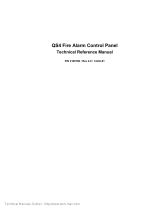Page is loading ...

© 2013 UTC Fire & Security. All rights reserved. 1 / 2 P/N 3101182 • REV 02 • REB 28FEB13
ANSREM Remote Microphone Installation Sheet
Product description
The ANSREM is a supervised remote microphone panel for
use with the ANS25, ANS50, and ANS100 audio notification
systems. The ANSREM makes it possible to send emergency
voice messages through the system speakers from a location
that is remote from the ANS panel.
The ANSREM uses 3-pair shielded cable to connect to
ANSREMSUP supervisory card, which is mounted within the
ANS master panel. Fault conditions in the wiring or in the
remote microphone circuitry are reported to the fire alarm
control panel (FACP) using the same supervisory path as the
ANS master panel.
Specifications
Table 1: Specifications
Model
ANSREM ANSREMSUP
Input voltage
24 Vdc 24 Vdc
Input current
Standby
Active
20 mA
40 mA
30 mA
50 mA
Wiring
12 to 22 AWG 12 to 22 AWG
Operation
When the system is in the alarm state, keying the ANSREM
microphone interrupts the alarm signal and digital message.
Live voice messages can then be broadcast over the system.
When the system is in normal standby state, the ANSREM
microphone can be keyed to make announcements at any
time.
Keying an ANSREM microphone at any time turns on the
In Use LEDs on all other ANSREMs, and disables the other
units. This ensures that only one operator is able page over the
system. If the microphone in the master ANS panel is keyed, it
overrides all ANSREM microphones.
Installation instructions
Ensure that all wiring and devices installed in the system meet
the following standards:
• NFPA 70 National Electrical Code
• NFPA 72 National Fire Alarm and Signaling Code
• NFPA 101 Life Safety Code
• Applicable state and local codes
Install this equipment in a clean, dry environment. Avoid
locations where equipment is subjected to vibration. Remove
all electronic assemblies from the enclosure before drilling or
punching the enclosure. Where possible, make all cable
entries from the rear or sides. Before making any modifications
to the enclosure, be certain that they will not interfere with the
assemblies.
Make sure all power is off before making any wire connections.
Terminals
Table 2: Terminal descriptions
Terminal [1]
Description
TB1
-1 V+ 24 Vdc 40 mA
TB1
-2 Ckt Neg
TB1
-3 Fault +24 V (pull down 10 mA)
TB1
-4 PTT +24 V 10 mA
TB1
-5 Audio 1 Vrms 10 mA
TB2
-1 MIC PTT +24 V 10 mA
TB2
-2 V+ 24 Vdc 100 mA
TB2
-3 PTT +24 V 10 mA
TB2
-4 Audio 1 Vrms 10 mA
TB2
-5 Ckt Neg
TB2
-6 Fault +24 V 10 mA
TB2
-7 Earth Ground
[1] TB1 designations are the same for both the
ANSREM and
ANSREMSUP. TB2 is on the ANSREMSUP only.

2 / 2 P/N 3101182 • REV 02 • REB 28FEB13
Wiring instructions
Refer to the wiring, terminal designation, and application
diagrams that follow.
1. Run 3-pair shielded wire (22 AWG minimum) from the ANS
master panel to the ANSREM remote microphone location.
2. Mount the ANSREMSUP supervision card in the ANS
master cabinet, using snap-track.
Attach snap-track to the ANS master cabinet as required. The
supervision card may already be factory-mounted and wired.
3. Make the wiring connections shown in Figure 1.
4. Verify correct installation of the end-of-line resistor (EOLR)
on the ANSREM.
Each module is shipped with an EOLR installed. When the
system has multiple ANSREM units, verify that the EOLR
is installed on the last unit only.
5. Apply power to test the system:
a. Test the ANS master microphone.
b. Test ANSREM remote microphone.
6. Place the panel in alarm and retest the ANS master
microphones:
a. Ensure that the tone and message are broadcast.
b. Test that keying the microphones overrides any
automatic message or tone.
Figure 1: Wiring the ANSREMSUP
(1) All wiring from ANSREMSUP is power-limited. All wiring must be
routed to maintain minimum spacing from any nonpower-limited
wiring.
(2) When circuits are power-limited, use power-limited cable as
detailed in the National Electrical Code, Article 760, such as FPL
or FPLP type cabling.
(3) Battery cabling is nonpower-limited. Do not route any power-
limited wiring within 1/4 in. of the battery cabling.
Figure 2: Wiring the ANSREM
(1) All wiring is power-limited.
(2)
The ANSREMSUP must be mounted in the ANS enclosure or in
another UL Listed cabinet within 20 ft. and connected using conduit.
(3)
The ANSREMSUP must be mounted using metal standoffs or an
earth ground connection must be made to TB2-7.
(4)
Maximum line resistance is 100 Ω per line: approx. 5,000 ft. using
22 AWG. Maximum line resistance also depends on the number
of devices.
2 ANSREMs = 100 ohms max. line resistance
3 ANSREMs = 80 ohms max. line resistance
4 ANSREMs = 65 ohms max. line resistance
5 ANSREMs = 50 ohms max. line resistance
Using more than 5 ANSREMs is not recommended
(5) EOLR is a 6/3 SIP 10 kΩ resistor network. Install EOLR on the
last ANSREM only.
(6)
Terminate the cable shielding at the ANSREMSUP. The shielding
must be continuous from the ANSREMSUP to the last ANSREM,
but must not be terminated on any ANSREM card. Join the
shielding at each cable break, but do not land the shielding on the
ANSREM card.
ANS card
ANSREMSUP
card
T
B
3
T
B
2
TO
ANSREM
TO
BATTERIES
(1)
(3) (2)
ANSREM (2)
ANSREMSUP
V+
NEG
FAULT
PTT
AUDIO
3-pair shielded cabling, 22 AWG minimum (4)
TO
ANS
TB2-11
TB2-10
TB2-6
TB2-2
TB2-1
TB3-8
T
B
2
T
B
3
EOLR (5)
MIC
GAIN
TO ADDITIONAL
ANSREM UNITS
EOLR ON LAST UNIT
ONLY (5)
YEL
RED
F
A
U
L
T
I
N
U
S
E
SUPERVISED
UNSUPERVISED
YEL
F
A
U
L
T
TB1
TB1
TB2
1
2
7
6
5
4
3
12345
1
2
3
4
5
(3)
MICROPHONE
JACK
Shielding (6)
Shielding (6)
(1)
/





